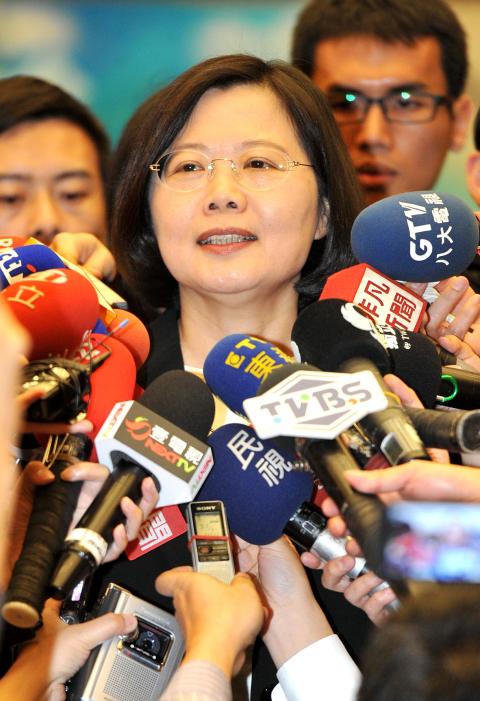|
Tsai takes stand on right to privacy
ASKED AND ANSWERED: In her statement, Tsai
characterized Shih Ming-teh’s remarks as ‘surprising,’ given his past work in
Taiwan’s democracy and human rights movement
By Vincent Y. Chao / Staff Reporter

Democratic Progressive Party (DPP)
presidential hopeful Tsai Ing-wen talks to the press following the third
televised session yesterday. She said she would not be responding to a media
furor over her sexual orientation.
Photo: Chien Jung-fong, Taipei Times
Democratic Progressive Party (DPP)
presidential hopeful Tsai Ing-wen (蔡英文) said yesterday she would not be
responding to a media furor over her sexual orientation.
“There is nothing wrong with any gender, sexual orientation or marital status.
Nobody has the right to question another [on this],” Tsai said in a short
-300-word public statement.
Tsai said she would use the opportunity presented by the furor to promote
awareness about discrimination, suggesting that an individual’s right to privacy
concerning their sexual orientation was akin to a human rights issue. She said
she would work to “eliminate gender discrimination in Taiwan.”
“I will lead Taiwan as a country that respects human rights and is more
accepting. I will also work to ensure that minority groups experience the same
quality of life, happiness and respect on this piece of land as everyone else,”
she added.
Former DPP chairman Shih Ming-teh (施明德) drew criticism on Thursday after he
called on Tsai, who is single, to clarify her sexual orientation, saying that
voters needed a “clear answer” before voting for her next year.
“She needs to be true to herself, her body, in order to be true to her beliefs
and her country,” Shih said.
Lawmakers across party lines, as well as gay rights and feminist groups, have
come to Tsai’s defense over the past two days, saying that it is irrelevant for
the presidential hopeful to disclose such personal details.
The Taiwan Women’s Link on Friday called on Shih to either explain the relevancy
of his remarks or “apologize to all single women, gays and female politicians.”
Tsai’s competitors in the DPP primaries also said they did not believe a
candidate should be questioned on their sexual orientation.
“Taiwan cannot be like this and politics should not be like this. I do not think
that it’s a good idea,” Su Tseng-chang (蘇貞昌) told reporters yesterday.
Hsu Hsin-liang (許信良) said he was “astonished” by Shih’s questions, which he
called a violation of Tsai’s privacy.
In the statement, Tsai said she would “definitely not” respond to a line of
questioning she characterized as “surprising” — considering Shih’s past work in
Taiwan’s democracy and human rights movement.
“Because if I did, it would amount to recognizing his right to question anybody
[on the issue],” Tsai said.
Asked whether she felt angered by the remarks at a later setting, she said she
“wasn’t angry, did not care and did not plan to respond on the issue any
further.”
Tsai, who has temporairily stepped down as DPP chairperson, has not been linked
to anybody romantically in the past decade she has been a public figure.
The questions come at a sensitive time for her, with two weeks left before the
telephone polls used to settle the primaries between April 25 and 29.
|
![]()
![]()
![]()